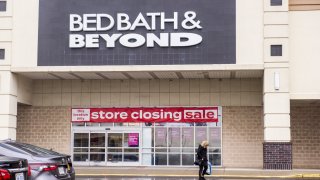
- Bed Bath & Beyond filed for bankruptcy protection and has asked the courts for permission to auction its assets.
- The struggling home goods retailer has been warning of a potential bankruptcy since early January.
- The company's 360 namesake stores and 120 buybuy Baby locations will remain open for the time being as it works to liquidate assets.
Bed Bath & Beyond on Sunday filed for Chapter 11 bankruptcy protection after it failed in several last-ditch efforts to raise enough money to keep the company alive.
The beleaguered home goods retailer has been warning of a potential bankruptcy since early January, when it issued a "going concern" notice that it may not have the cash to cover expenses after a dismal holiday season. Shares of the company closed at 29 cents Friday, giving it a market value of $136.9 million. The stock is down about 88% this year. Last April, it was trading around $20 a share.
The company's 360 namesake stores and 120 Buybuy Baby locations will remain open for the time being as it begins to close the business and liquidate assets. But it has filed motions in New Jersey bankruptcy court asking permission to auction the two brands, the company said in a release. It has already committed to closing all of its Harmon FaceValue stores.
We're making it easier for you to find stories that matter with our new newsletter — The 4Front. Sign up here and get news that is important for you to your inbox.
As of late November, Bed Bath had about $4.4 billion in assets and $5.2 billion in debts, court filings show. Alongside a long list of creditors, including vendors like Pinterest, Keurig and Blue Yonder, it owes the most to BNY Mellon at $1.18 billion, the documents show. It has between 25,001 and 50,000 total creditors and employs about 14,000 non-seasonal workers, court filings say.
"Millions of customers have trusted us through the most important milestones in their lives – from going to college to getting married, settling into a new home to having a baby. Our teams have worked with incredible purpose to support and strengthen our beloved banners, Bed Bath & Beyond and buybuy BABY," CEO Sue Gove said in a statement.
Sixth Street has agreed to lend Bed Bath $240 million in debtor-in-possession financing so the company can have the cash flow necessary to support operations through the bankruptcy process. Bed Bath said it plans to continue to pay employees wages and benefits, maintain customer programs and honor obligations to vendors.
Money Report
Holly Etlin, a longtime retail turnaround expert and a partner and managing director with advisory group AlixPartners, has been appointed as Bed Bath's chief financial officer and chief restructuring officer, filings say.
"Bed Bath and Beyond has finally succumbed to the fact its business is broken and filed for bankruptcy," said Neil Saunders, a retail analyst and consultant who works as managing director of GlobalData.
"While it has been a long time coming," he said, "they simply could not defy gravity forever."
The downward spiral
Bed Bath has been hanging on by a thread since January but has refused to go down without a fight. It secured what was then-considered a Hail Mary stock offering in early February that was expected to infuse more than $1 billion in equity into Bed Bath, but the plan faltered and brought in only $360 million, the company said.
At the end of March, Bed Bath announced another stock offering it hoped would bring in $300 million, but that news sent the share price tumbling and it struggled to raise the funds it hoped the offering would provide. As of April 10, the company had sold approximately 100.1 million shares and raised only $48.5 million.
In filings, the company warned if it didn't raise the anticipated proceeds from the offering, it would likely have to file for bankruptcy protection.
Days after the second stock offering was announced, Bed Bath said it had partnered with liquidator Hilco Global to boost its inventory levels. Under the agreement, Hilco subsidiary ReStore Capital agreed to buy up to $120 million in merchandise from the company's key suppliers after relationships with Bed Bath's vendors soured because of its liquidity issues.
However, the plans ultimately proved futile.
The retailer has struggled to maintain relationships with its vendors and has been grappling with low inventory levels, lagging sales and a rapidly dwindling cash pile.
Going into the holiday season, Bed Bath had difficulty keeping its shelves stocked and because of its liquidity issues, some vendors began asking for prepayments, the company said in securities filings.
In late March, the company reported preliminary results for its fiscal fourth quarter, with net sales of roughly $1.2 billion and comparable store sales declining in the range of 40% to 50%. The company noted negative operating losses have continued, although it said it hadn't depleted its free cash flow.
The company reported $2.05 billion in revenue for the fiscal fourth quarter of 2021.
Leadership shuffles and failed plans
For years, Bed Bath enjoyed healthy annual profits but as giants like Amazon came into the picture and began chipping away at the retailer's market share, its profits began to slide.
In the twelve months ended March 2, 2019, the company posted $137 million in net losses and since then, hasn't managed to dig itself out of the red.
In October of that year, the company tapped Target veteran Mark Tritton to be its CEO. He launched an aggressive strategy change that favored private label brands over national brands in a bid to boost to the retailers bottom line. The margins are higher for private label brands and a similar strategy had worked at Target under Tritton's leadership – but the merchandise shift failed to land with customers.
Further, with a focus on private label brands, many manufacturing and logistics fell under Bed Bath's responsibility, which became increasingly difficult when the Covid-19 pandemic hit early the following year.
"If there is a single point of failure of Bed Bath and Beyond, it's that the company stopped being relevant to consumers. Arguably, this goes back a long way thanks to the rise of online and the improvement of home offers at rivals like Target. Against this increased competition, Bed Bath and Beyond's approach to retail – which lacked inspiration – was found wanting," said Saunders.
Saunders called Tritton's turnaround efforts "poorly executed and out of alignment with what shoppers wanted."
Last June, Bed Bath announced it would replace Tritton with Gove. She then launched her own ambitious turnaround plan, which she hoped could save the business. However, she struggled to repair the business's relationship with key vendors and the turnaround efforts coincided with high inflation that affected consumer spending while rising interest rates slowed the housing market.
Plus, consumers who had spent 2020 and 2021 staying at home and updating their living spaces amid the pandemic were now spending on travel, eating out and other out-of-home experiences.
The company experienced more upheaval last year, including brief involvement by activist investor Ryan Cohen over the summer and the suicide of Bed Bath finance chief Gustavo Arnal in September. In mid-January, the company was looking to find a buyer willing to keep it afloat with an infusion of cash. Soon, though, Bed Bath revealed in a securities filing that it didn't have enough cash to pay its debts and had defaulted on its credit line with JPMorgan.
The company was able to make its interest payments using funding gained from the first stock offering, but at the time it warned it would "likely" have to file for bankruptcy and see its assets liquidated if the deal didn't go as planned.
The company had loans with JPMorgan and Sixth Street that were reduced in late March after its second stock offering was announced. At the time, its total revolving commitment decreased from $565 million to $300 million and its revolving credit facility was reduced from $225 million to $175 million. Under the reduced credit agreements, Bed Bath was on the hook for monthly interest payments.
The company said it was attempting to lower costs by reducing capital expenditures, closing stores and negotiating lease deals but warned in filings the efforts "may not be successful."
At a popular Bed Bath outpost in New York City, a since laid-off staffer recently told CNBC that workers were standing around not knowing what to do after the company suddenly cut off in-store pickup and deliveries at the location.
The worker was told liquidators would be coming the following day and soon learned they wouldn't receive severance after more than two decades with the company.
"It was just so fast," the worker said.






